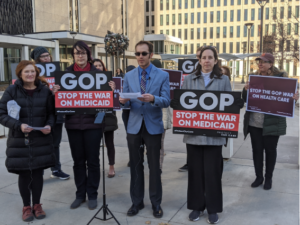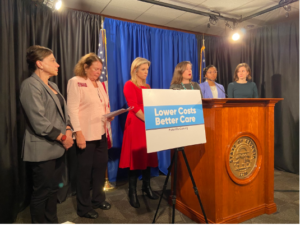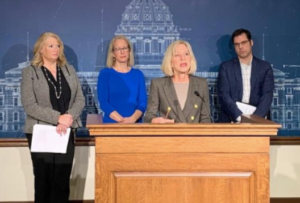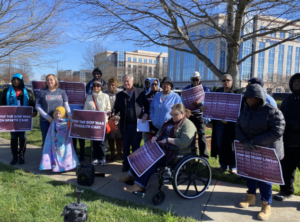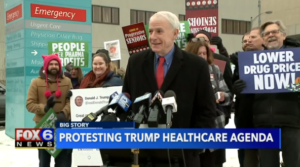Protect Our Care’s Days of Action wrapped up just as the Supreme Court rejected House Democrats and Democrat state attorneys general’s request to fast-track consideration of the Trump-Republican lawsuit to overturn the Affordable Care Act, keeping the health care of millions of Americans in limbo.
Over the last two weeks, Protect Our Care organized 11 Days of Action to remind Americans how last month’s decision by the Fifth Circuit Court of Appeals in Texas vs. United States will impact every corner of the American health care system. Protect Our Care held events across the country with state attorneys general, state legislators and health care advocates to show how their communities will be impacted by this disastrous lawsuit if Trump and Republicans succeed in overturning the health care law.
Protect Our Care’s Days of Action included:
Medicaid Expansion
Protections For People with Pre-Existing Conditions
Protection For Individuals with Disabilities
Key Protection For Seniors
LGBTQ Health Care
Children’s Coverage
Protection For Women
Prescription Drug Costs
Rural Health
Marketplace Signups & Financial Assistance
Coverage For Communities of Color
Here’s a look at the events and some of the news coverage that took place over the Days of Action:
ARIZONA
Friday, January 17th – Letter Drop at AG Brnovich’s Office
Protect Our Care Arizona was joined by patient advocates and the Arizona Alliance for Retired Americans at Attorney General Mark Brnovich’s office to deliver letters from Arizonans urging the attorney general to protect their health care amid legal challenges to the Affordable Care Act. Last month, the Fifth Circuit Court of Appeals ruled in favor of the Trump administration and Republicans in Texas vs. United States, a partisan lawsuit to dismantle the Affordable Care Act. The decision is a devastating blow to Arizonans, particularly seniors, who depend on the law to keep health care costs low. You can view the post-event release here.

COLORADO
Wednesday, January 15th – Press Conference with Advocates
Protect Our Care Colorado was joined by patient advocates, health care experts, and Rocky Mountain Values at a press conference outside of Senator Cory Gardner’s office to denounce Senator Cory Gardner’s support for the Fifth Circuit Court of Appeals’ decision in Texas vs. United States, the partisan lawsuit seeking to dismantle the Affordable Care Act (ACA). Speakers described the devastating toll the lawsuit could take on their families, and health care experts explained why partisan efforts to throw our health care system into chaos are irresponsible and dangerous for Coloradans. View the post-event release here, and watch video of the event here.

GEORGIA
Tuesday, January 14th – Press Conference with Women State Legislators
Protect Our Care Georgia was joined by a host of women state legislators, including State Sen. Jen Jordan, State Rep. Pat Gardner, State Sen. Nan Orrock, State Sen. Nikema Williams; Laura Simmons, NARAL state director; and Jarah Cotton, a native Georgian and Harvard freshman with a pre-existing condition who relies on the ACA to stay in her parents’ coverage. They discussed the consequences of the Texas lawsuit on women’s health care and called on new Senator Kelly Loeffler to stand up for her constituents. View the post-event release here, and watch video of the event here.

Georgia Recorder: Georgia Dems push new GOP U.S. Senator to oppose Obamacare repeal
CBS46: Women lawmakers concerned, call on Loeffler to push against lawsuit
The Newnan Times-Herald: Court: Part of ‘Obamacare’ invalid, more review needed
MAINE
Friday, January 17th – Press Conference on Pre-existing Conditions Protections
Protect Our Care Maine was joined by State Rep. Donna Doore, who is also a three-time cancer patient, and Whitney Parrish, Policy Director of Health Equity Alliance, to discuss how the decision in favor of the Trump administration in the Texas v. United States lawsuit would be devastating to Mainers with pre-existing conditions. They also condemned Sen. Susan Collins’ failure to sign on to a Senate resolution that would reverse the administration’s support of the lawsuit, and called on her to stand up for her constituents. View the post-event release here, and watch video of the event here.

MICHIGAN
Thursday, January 16th – Roundtable with AG Nessel and Advocates
Protect Our Care Michigan was joined by Attorney General Dana Nessel, the Michigan League for Public Policy, and patient advocates to discuss the disastrous ruling in favor of the Trump administration and Republicans in Texas vs. United States and its potential impact on seniors, patients with pre-existing conditions, and those who rely on the Healthy Michigan Plan. Participants emphasized the importance of the Affordable Care Act ensuring healthcare access for the seven percent of Michiganders using Medicaid, young people sharing their parents’ insurance, and those with pre-existing conditions both in Michigan and across the country. View the post-event release here.

WLNS: AG Nessel takes part in discussion on future of Affordable Care Act
Michigan Advance: Hospitals, economists join 20 AGs in ACA court fight
MIRS: Did Republicans Hitch Their Wagon To Political Loser With Anti-ACA Stance?
MINNESOTA
Friday, January 17th – Press Conference with State Legislators and Advocates
Protect Our Care Minnesota was joined by Planned Parenthood Minnesota, North Dakota, South Dakota Action Fund, and Reps. Laurie Halverson and Rep. Kelly Morrison to discuss the disastrous ruling in favor of the Trump administration and Republicans in Texas vs. United States, a partisan lawsuit to dismantle the Affordable Care Act (ACA), and its potential impact on women’s health. Speakers explained how the Affordable Care Act improved access to care for women in Minnesota and across the country, and described how the Fifth Circuit’s decision in favor of the partisan lawsuit could leave women without the care they depend on. View the post-event release here.

NEVADA
Thursday, January 16th – Press Conference with Health Care Advocates
Healthcare advocates including Assemblywoman Michelle Gorelow, Healthcare Advocate Allison Stephens, Alex Camberos with the Children’s Advocacy Alliance, and Forrest Darby with the Nevada Alliance of Retired Americans denounced the Fifth Circuit Court of Appeals’ decision in the Trump administration and Republicans in Texas vs. United States, a partisan lawsuit to dismantle the Affordable Care Act at a press conference on Thursday. Participants called on Republican lawmakers to stand up to the lawsuit and for the Trump administration to stop its attempts to repeal the law. You can view the post event release here.

NEW HAMPSHIRE
Thursday, January 16th – Editorial Meeting with Brad Woodhouse and Laconia Daily Sun
Protect Our Care New Hampshire arranged a phone meeting between the managing editor and a reporter at the Laconia Daily Sun and Brad Woodhouse. They discussed what the Affordable Care Act has done for the state of New Hampshire, especially in rural areas, and the consequences for Granite Staters if the ACA were to be struck down in court.
NORTH CAROLINA
Friday, January 17th – Press Conference with Health Care Advocates
Protect Our Care North Carolina was joined by Piedmont Rising, Action NC, and Little Lobbyists at a press conference outside Sen. Thom Tillis’ Charlotte office to condemn the Fifth Circuit Court of Appeals ruling in favor of the Trump administration in Texas vs. United States, a partisan lawsuit to dismantle the Affordable Care Act. Speakers criticized Senator Tillis for his support of the lawsuit, that could leave millions of North Carolinians without access to health care. Advocates shared their stories of obtaining health care through the Affordable Care Act, and described and what loss of coverage would mean for their families. Speakers called on Sen. Thom Tillis to stand up for his constituents, and urged the Supreme Court to take action on the case immediately. View the post-event release here.

WISCONSIN
Tuesday, January 14th – Doctors Press Conference
Ahead of Trump’s visit to Milwaukee, Protect Our Care and the Committee to Protect Medicare held a press conference with several doctors called attention to Trump’s broken promises on health care and warned of the impending danger of the Texas lawsuit winding its way through the courts. You can view the post-event release here.
Tuesday, January 14th – Trump Bracketing Press Conference
In response to Trump’s visit to Milwaukee, the Democratic Party of Wisconsin and Milwaukee Mayor Tom Barrett held a press conference calling attention to the president’s attempts to eliminate the ACA. His most recent attack being the Texas lawsuit—which would overturn the ACA in its entirety—is still pending in the courts. You can view the post-event release here.

Wisconsin Public Radio: Ahead Of Trump Rally, Milwaukee Streets Packed With Supporters
WITI: ‘An attack on Obamacare:’ Dems protest Pres. Trump’s ‘broken promises on health care’
Milwaukee Journal Sentinel: Trump sends a message to Democrats with a rally in Milwaukee, home of the 2020 DNC



